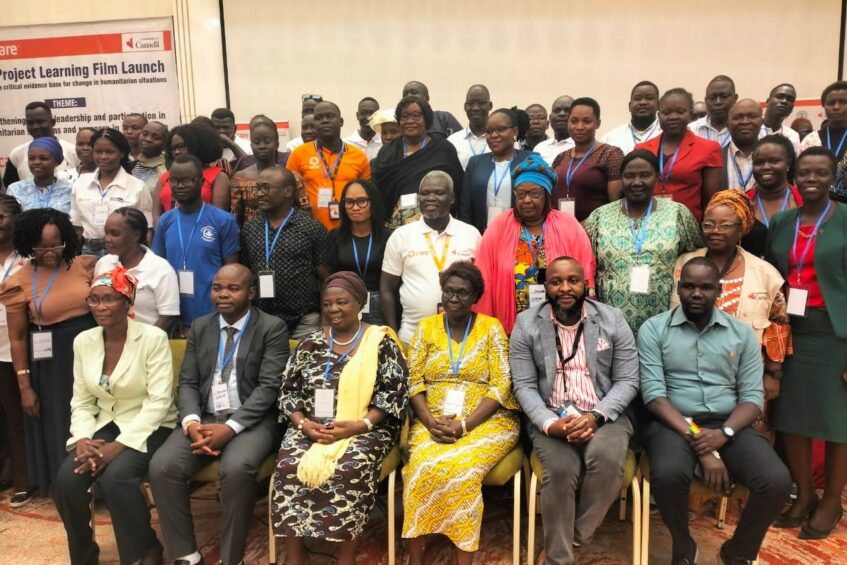You are here: Home | Humanitarian | News | Care International urges inclusion of women in leadership roles

The launch of the Gender in Emergency (GiE) Project Learning Film in Juba. (Photo: Moyo Jacob Felix).
The Country Director for Care International called for the involvement of women in leadership roles in South Sudan to enhance their ability to participate in peace-building and decision-making processes.
Abel Whande made the appeal on Thursday at the launch of Gender in Emergency (GiE) Project Learning Film aimed at building a critical evidence base for change in humanitarian situation.
The launch was made under the theme: “Strengthening women leadership and participation in humanitarian situations and response in South Sudan.
Care director, Whande, said women are able to contribute to conflict resolution and peacebuilding initiatives, when given the chance.
“We know that the elections are coming, and I know women play a very big role when it comes to democracy, when it comes to their participation in their voice, and they bring peace in most cases,” he told Eye Radio.
“In most cases when you see women coming together, they want to make sure that there’s no conflict.”
“I want to encourage all of us, that as we work towards this, let’s also ensure that we include them. They must participate in some of these big changes that are going to happen in our country, they must have a voice along the way.”
Ambassador-designate of Canada to South Sudan, Aly-Khan Rajani said there is a need to enhance women’s roles in leadership to make them role models to other women and girls in grassroots.
Mr. Rajani said there is no better time to uplift women and promote them to leadership positions other this time of South Sudan’s elections year.
“You’ve seen some examples to remove the barriers faced by women and to improve their participation in leadership. And as we’re talking about election year, what better time than to have done this project to talk about what women are capable of doing,” he inquired.
“While a project may end and project cycles come and go, please don’t forget this is building roots in societies. This is about changing the way people think when they get exposed to different tools and different issues.”
“They see by example when women lead and show that they’re capable, that other women and other girls look up to them and say, well, I can do it too. I want to do it, too. Let’s band together. Let’s make it happen.”
On his part, Ceaser Lupai, Gender in Emergency Project Manager for Care in Wau, stressed the need to harness women’s potential in leadership roles.
“I can say women are good leaders because when women lead, we all benefit. We as men, also, we benefit. But when men lead, sometimes the benefit does not go down. But when women lead, it is for all of us.”
“It is good that we encourage women to lead. It is important that we give them opportunities. We give them chances so that they can also realize their potential, and then they can keep it.”
One of the participants, Juliet Elino said women are selfless leaders who are capable of managing difficult situations.
“Women, we are leaders by nature. From the time we are born, we are able to lead without someone showing us examples. A woman who even did not go to school is able to lead and control her home.”
“I’m convinced women are leaders because when a woman leads, she always leads for the benefit of everyone, not for her own benefits. So, in everything that she does, she thinks of the interests of the community, not her own interest.”
Another participant, Linda Brenda, said women’s role in leadership and governance can be enhanced through trainings, emphasizing on the need to enable women undertake active roles in the forthcoming election.
“We strengthen their leadership through trainings, trainings with programs of leadership and governance in the country. Because if we leave these women behind, they will not come up. Remember, now we are coming towards elections.”
“This is the time for us to come up, to go to the grassroots level, talk to these women, tell them that what a man can do, if even a woman can do it, they can also lead the country.”
Support Eye Radio, the first independent radio broadcaster of news, information & entertainment in South Sudan.
Make a monthly or a one off contribution.
Copyright 2024. All rights reserved. Eye Radio is a product of Eye Media Limited.